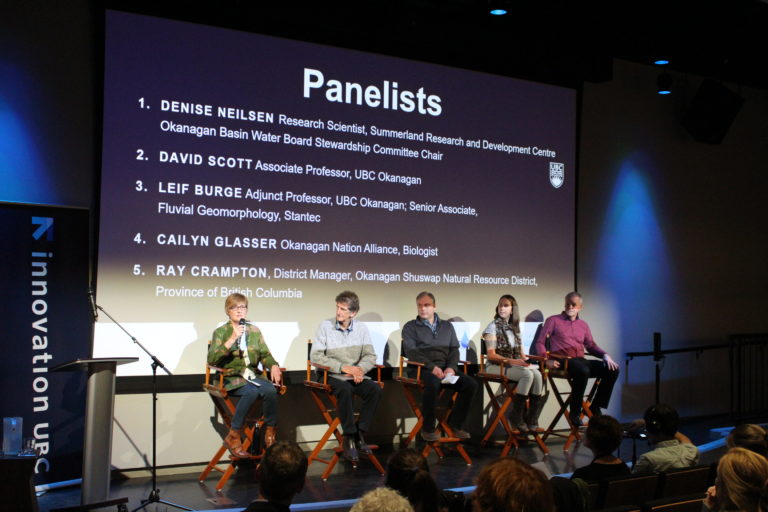
Traditional firekeeping is a specific science, explains Indigenous knowledge keeper Richard Armstrong of the Penticton Indian Band and Syilx First Nation. When a forest fire burns hot and fast, the flames wrap around the trees causing a scarring pattern that marks centuries of prescribed burns by Indigenous caretakers.
Elder Armstrong’s opening remarks set the stage for an insightful panel discussion at the second annual Community Water Forum last November in Kelowna. During the event, over 100 citizens, scientists and municipal leaders gathered in a darkened theatre to deepen their collective understanding of how our lakes, rivers and streams are being affected by climate change and extreme weather in the Okanagan.
“Undeniably, our contribution to climate change has created the perfect storm,” says Ray Crampton, Acting Regional Executive Director, Resource Management (Okanagan Shuswap) for the Province of B.C., and member of the Okanagan Water Stewardship Council. “We have chosen to live in places we shouldn’t. We have diverted water from its natural drainage patterns and prevented it from flowing where it wants and needs to go.”
The resulting effects on our landscape have been catastrophic, with many communities in the southern B.C. interior still dealing with the aftermath of the 2017 flood and wildfire season. The events were among the worst in the province’s history, prompting a 10-week provincial state of emergency, with more than 65,000 residents displaced, flood response costs estimated at more than $73-million and direct fire suppression costs estimated at more than $568-illion.
Born from UBC Okanagan’s partnership with the Okanagan Basin Water Board and Okanagan Nation Alliance, the Community Water Forum translates research into action (Strategy 9: Knowledge Exchange) by creating a safe space for diverse groups to come together and proactively discuss issues of shared concern.
Conversing in a respectful, meaningful way is a key ingredient for successful collaboration. Now in its third year, the Community Water Forum has already tackled a range of topics, including holistically managing municipal water infrastructure and mitigating the effects of fire and flood in the southern B.C. interior.
The aim of the series is to start conversations, initiate respectful dialogue, and create opportunities for new relationships to develop. The conversation often continues and pathways for collaboration subsequently emerge through connections made.
Cause and Effect
Okanagan Nation Alliance biologist Cailyn Glasser shares an adage about what happens when people neglect their responsibility to take care of the forest and the landscape.
Caring for the the landscape includes using fire as a preventative tool, Ms. Glasser explains. “When people aren’t taking care of the land (with fire), thunder and lightening and the land will start to have a conversation without us. Catastrophic things happen when we get left out of the conversation.”
“We live on a landscape that was historically shaped by fire and we now live on a landscape that is shaped by fire suppression.”
As a collective, Ms. Glasser believes we’ve been removed from the conversation with the land – often due to our own policy and legislation. She proposes the implementation of thoughtful fuel management and ecosystem restoration treatments, prescribed by First Nations, to mitigate the past 200 years of fire suppression.
Planning for the Future

The 2018 Community Water Forum engaged a diverse panel of experts on a range of discussion topics, including:
- Rate of Change: increased frequency, timing, and severity of wildfires and floods;
- Connectivity: interdependent health of our forests, food and water supply; and
- Hope: working together and responding proactively to climate change threats.
The recommendations for how society can work together to proactively prepare for and mitigate the effects of fire and flood include:
- Reduce greenhouse gases – Recommended by Denise Neilsen, Research Scientist (Retired), Summerland Research and Development Centre; Okanagan Basin Water Board Stewardship Committee (Emeritus)
- Use fire as a tool to manage fuel loads – Recommended by David Scott, Associate Professor, UBCO
- Design new infrastructure to withstand larger floods – Recommended by Leif Burge, Senior Associate, Fluvial Geomorphlogy, Stantec; Adjunct Professor, UBCO
- Re-establish traditional burning practices – Recommended by Caitlyn Glasser, Biologist, Okanagan Nation Alliance
- Calibrate our lands based on a common vision – Recommended by Ray Crampton, Acting Regional Executive Director, Resource Management (Okanagan Shuswap), Province of BC; Okanagan Water Stewardship Council
The third annual Community Water Forum took place in November 2019. Visit research.ok.ubc.ca/cwf for details.